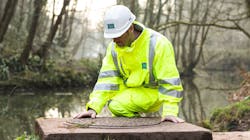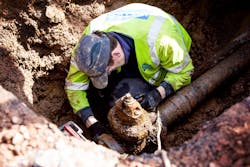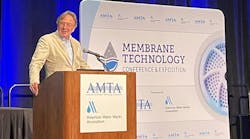It’s a brave and bold solution to combine artificial intelligence (AI) and the Internet of Things (IoT) to optimize a sewage network, but that is what the United Kingdom’s second-largest water company, Severn Trent, is setting out to do after winning £2M ($2.6M USD) of funding from Ofwat’s Water Breakthrough Challenge.
Severn Trent, the water utility company for the UK Midlands region, has long recognized that the potential for fully autonomous waste catchments exists; they just needed the means to unlock it. Severn Trent began to collaborate with fellow utilities Hafren Dyfrdwy, South West Water, Southern Water, and Thames Water — as well as global innovators at Blackburn Starling, BT, Microsoft, Rockwell Automation, 8Power, and the University of Exeter and National Cyber Security Centre. This collaboration of organizations recently secured funding to explore how AI can enable autonomy in waste catchments in an innovation project which will run for three years.
The UK’s water industry and its regulators agree that climate change, population growth, urban expansion, increasing water consumption, and changing customer behaviors mean that the industry needs solutions that are flexible and capable of adapting to what future demand will throw at them.
The motivation for this innovative research is geared toward improving the region’s customer experience and environmental wellbeing by reducing flooding and pollution. The UK water sector has a legacy of suboptimal, low-tech solutions in waste catchments to minimize the risk of asset failure (which can lead to sewage pollutions and flooding, impacting customers and the environment), reduce energy consumption and process emissions, and maximize resource recovery.
Water companies have seen a significant increase in hydraulic sewer flooding in the last five years (over 500 percent in some cases) and the water industry accounts for 35 percent of river pollutions. Models of population growth and climate change predict that this problem will continue to increase over the coming years.
Between 2020-2025, population growth is projected to reach 1.39 million, with an additional 371,000 people moving into Severn Trent’s service area, an increase of 12.1 percent from the 2015-2020 period. Other water companies will experience similar levels of increased pressure on their networks.
The UK’s national weather service predicts that over the next 50 years, the UK’s winters will become 30 percent wetter and summers will become 60 percent drier.
Understanding the Problem
Progress has been made across the water industry in several aspects of pollution prevention. However, these have generally focused on standalone solutions rather than holistic solutions.
Historically, water companies have developed and deployed technologies for individual challenges, such as: intelligent sewage pumping stations that utilize controller logic to detect storm events, automatically optimizing for energy or flow; AI models to predict the likelihood and customer impact of sewage pumping station failures or floods, allowing for proactive intervention; applications for automated sluice gates to attenuate flows, optimize storage, and calm flow into treatment works; and low-cost IoT sewer sensors to warn of blockages before they affect customers.
AI is Changing the Way the World Works
The large scale population growth and climate change is affecting customers across the UK. However, AI and machine learning present a significant opportunity to bring these solutions together into a single autonomous catchment management solution, able to respond to the increasing demands on Severn Trent’s assets and customers, as well as the environment.
One of the key barriers to the adoption of AI is its vulnerability to cyber threats. Proposed AI solutions are often rejected by water companies due to a lack of confidence in the security of the system. But, with the right security in place, AI has the potential to transform the way the water sector operates.
To date, individual water companies have made inroads into the application of AI, but only for small performance improvements. To drive transformative change and realize the benefits for stakeholders, it’s imperative to share data, best practices, and innovative solutions within the sector.
Severn Trent’s cross-sector coalition proposes to pilot an autonomous waste catchment in the island’s Midlands and Southwest regions. This will combine emerging technologies for comprehensive testing, and create a shared blueprint that is tested, proven, and ready to be scaled across the UK.
With the blueprint, water companies would be able to:
- Minimize the risk of flooding and pollutions in real time through intelligent localized autonomous control of the catchment;
- Minimize the risk of asset failure by integrating prescriptive, condition-based maintenance of sewage pumping stations and rising mains;
- Reduce energy consumption and process emissions, and maximize resource recovery by maintaining steady-state conditions to the sewage treatment works; and
- Protect the system from cyber threats and malicious attacks (a key barrier to the adoption of AI solutions) by developing a security wrapper for connected Artificial Intelligence of Things (AIoT) devices.
Over the next three years, Severn Trent and its partners will create these blueprints and integrate the appropriate sector cybersecurity requirements for the use of AI technology on a waste or water network.
Partnership Working
Partnering with Rockwell Automation has enabled Severn Trent to leverage the company’s domain expertise gained within the Information Technology/Operational Technology (IT/OT) layer to bring about scalable solutions for all disciplines of the water industry.
Rockwell Automation is working closely with Severn Trent and their partners, providing access and collaboration with specialist teams in the areas of network and cyber security, AI, and machine learning applications — along with advice and support on other emerging technologies. Having provided unique solutions within other sectors of business, many of these technologies will be transferable to the water industry.
Rockwell Automation’s specialists will work with Severn Trent to define the best vendor-agnostic technologies and solutions; leveraging the considerable expertise gained across many different verticals to help develop a solution that delivers a real-world application.
“This application will show how the adoption of AI and machine learning, in addition to access to both real time and historical data, can deliver an intelligent Connected Enterprise application that can be scalable and deployable within the UK water sector,” Mark Watson, water and wastewater solutions provider at Rockwell Automation said.In addition to access to specialist teams, Rockwell Automation is providing the software and hardware to ensure the best possible solution, in order to create a new standard for future deployment within the sector.
Short and Long Term Benefits
The project is ambitious. In the short term, it will optimize the use of latent storage within networks, optimize the flow into sewage treatment works and develop a security wrapper for connected devices.
The longer-term outcomes will minimize the risk of asset failure, reduce energy consumption and process emissions, facilitate sustainable growth in communities and allow catchments across the UK to leapfrog the technology gap, resulting in fewer spills, floods, and pollution. WW
Published in WaterWorld magazine, January 2022.






